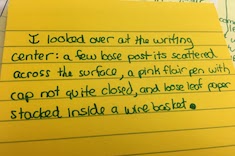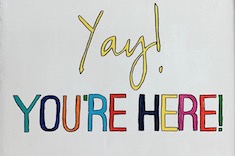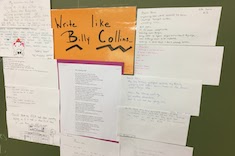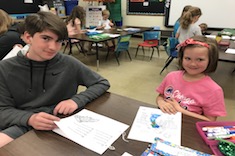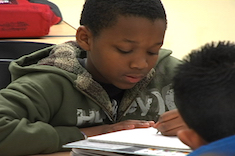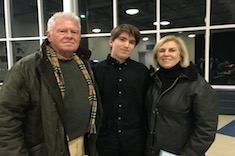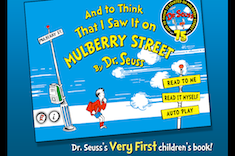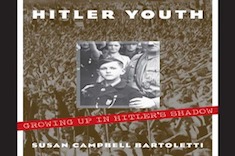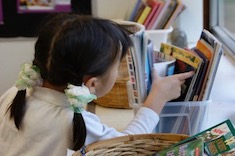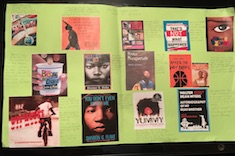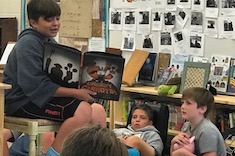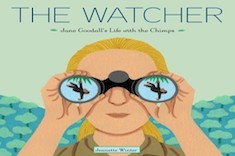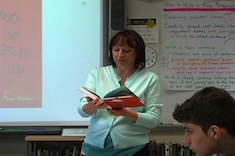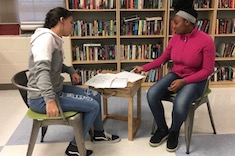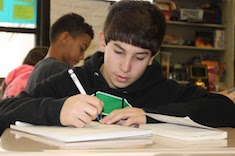7th
Latest Content
Student Ownership of Literary Analysis
Christy Rush-Levine shares the strategies she uses to help her middle school students take ownership of their literary analysis essays.
Studying Craft and Punctuation in Sentences from Read Alouds
Tara Barnett and Kate Mills share the power of teaching writer’s craft in bite-sized chunks, through careful study of mentor sentences in read alouds.
Keeping Parent Communication Open in Middle School
Tara Barnett and Kate Mills find that they have to change the way they think about connecting with families once students reach middle school.
Observing Skilled Readers
Mark Levine wonders why his most some of his most skilled readers take the most time to get through texts. So he asks them, and gets some fascinating answers he uses to assist struggling students.
Creating a Safe Space in Middle School
Christy Rush-Levine ponders what it means to create a safe space for all of her middle school students, and then makes some changes.
Poetry and Pastiche
Tara Barnett and Kate Mills introduce their middle school students to pastiche, a technique of mimicking the craft of favorite poems and poets.
Kindergarten and Middle School Poetry Partnership
Middle schoolers and kindergartners forge friendships at Katherine Sokolowski’s school through a sweet poetry writing and sharing project.
Exploring Author’s Craft in Graphic Novels
Christy Rush-Levine finds her middle school students need more support and scaffolds to understand authors’ craft in graphic novels.
Pairing Video Clips with Text: The Great Depression
Mark Levine has his middle school students “closely read” paired videos as well as texts to ponder the value and accuracy of different historical sources.
Self-Esteem and Literacy: Understanding Jeff
Jeff is apathetic and unengaged. To help this middle school learner, Mark Levine needs to understand his history. Mark shows the power of interviews for connecting with struggling teen learners.
Collaborating for Understanding in Writing
Mark Levine realizes explaining expectations for an essay assignment over and over again isn’t working. But when he has students write in pairs for a portion of his workshop, magic happens.
Community Timeline Project
Katherine Sokolowski uses the Community Timeline Project to bring together students and older community members around history and writing. Includes a downloadable interview guide to help students record the interviewee’s life story.
Scaffolding Instruction in an Author Study
Christy Rush-Levine scaffolds her middle-school students’ understanding of craft moves by moving from short stories to novels when studying specific authors.
Magic Connections: Young Adult Literature in a Social Studies Class
Mark Levine shows how young adult literature is a potent tool to drive learning in his middle school social studies classroom.
The Freewrite Pause
Mark Levine finds his middle school students need more time to digest learning from brief articles. Freewriting provides the perfect pause for promoting more reflection and insight.
Whole-Class Reflection in Middle School
Mark Levine explains why whole-class reflection is an essential component of his middle school workshops.
Building Reading Identities Across the Year
The start of the school year is often all about building reader identities in classrooms. And then October comes, and many of the activities that help students celebrate their reading histories and preferences are forgotten. Tara Barnett and Kate Mills share ways teachers can continue to help students define, refine, and expand their reading identities all year long.
Textual Lineage
Christy Rush-Levine uses book covers to help her middle-school students explore their histories (or “lineages”) as readers.
Introducing Social Studies Concepts with Picture Books
Mark Levine explains how picture books are powerful teaching tools in his middle school classroom.
Read Aloud in Middle School
Katherine Sokolowski values read aloud for her middle school students and struggles to find time for them. Her solution? A picture book a day, better known as the #bookaday activity.
Reading and Thinking Aloud in Middle School
Mark Levine combines reading and thinking aloud in a minilesson to help his middle school students grapple with complex texts.
Jane Goodall Inquiry: Introducing Expectations
Katherine Sokolowski introduces her students to routines and expectations early in the year with a unit on Jane Goodall, including many short read alouds.
Back-Channel Conversations During Read Alouds
Christy Rush-Levine considers some of the “underground” ways in which she converses about books at conferences and on social media, and decides to set up a back channel for similar conversations about read alouds in her classroom.
Summer Literacy
“What can I do to help my son and daughter stay sharp and not lose momentum during the summer?” When a parent asks this question, Mark Levine offers his Top Six Summer Slide Preventers.
Releasing the Teaching to Students
Mark Levine releases responsibility for teaching and assessment to students late in the school year, and hears echoes of learning from previous units.
Who Owns the Learning?
An enthusiastic student response to an author visit inspires Christy Rush Levine to revamp her upcoming unit on craft moves to foster more student ownership.
A Fresh Take on Persuasive Writing
Louise Wrobleski uses video clips, children’s literature, and newspaper articles to teach middle school students new ways to craft persuasive writing.
Reading That Changes Us
Tara Barnett and Kate Mills slow down the “Article of the Week” nonfiction reading activity, making space for more reflection and thoughtful discussion.
Reading Bingo
Gretchen Schroeder has developed a fun version of Reading Bingo to help students explore their identity as readers. The activity includes clever social media inspired options like creating memes and “bookstagram” posts.
Scaffolding Revision with a Mentor Text
Tara Barnett and Kate Mills show how to break down mentor texts into brief excerpts for step-by-step scaffolding of writers in the intermediate grades.
Browse Content By
Type
Category
- Assessment Tools
- Big Fresh Archives
- Booklists
- Choice Numeracy
- Classroom Design
- Common Core
- Community Building
- Conferring
- Content Literacy
- Digital Literacy
- English Language Learners
- Equity
- Family Relations
- Free Samples
- Guiding Groups
- Leadership
- Literacy Coaches
- Mentor Texts
- Minilessons
- New Teacher Mentors
- Podcasts
- Poetry
- Quote Collections
- Reading Strategies
- Self Care
- Struggling and Striving Learners
- Talking and Listening
- Teacher Study Groups
- Teaching Reading
- Teaching Writing
- Word Study and Vocabulary
Author
- Melissa Quimby
- Nawal Qarooni
- Gwen Blumberg
- Julie Cox
- The Lead Learners
- Hannah Tills
- Josie Stewart
- Ruth Metcalfe
- Mallory Messenger
- Becca Burk
- Jodie Bailey
- Vivian Chen
- Mary Brower
- Tiffany Abbott Fuller
- Stephanie Affinito
- Ruth Ayres
- Leigh Anne Eck
- Heather Fisher
- Shari Frost
- Julie Johnson
- Suzy Kaback
- Gigi McAllister
- Shirl McPhillips
- Melanie Meehan
- Cathy Mere
- Debbie Miller
- Tara Barnett and Kate Mills
- Tammy Mulligan
- Dana Murphy
- Bitsy Parks
- David Pittman
- Brenda Power
- Heather Rader
- Matt Renwick
- Mandy Robek
- Christy Rush-Levine
- Gretchen Schroeder
- Jen Schwanke
- Brian Sepe
- Katherine Sokolowski
- Stella Villalba
- Jennifer Vincent
Grade Level
Choice Literacy Membership
Articles
Get full access to all Choice Literacy article content
Videos
Get full access to all Choice Literacy video content
Courses
Access Choice Literacy course curriculum and training


